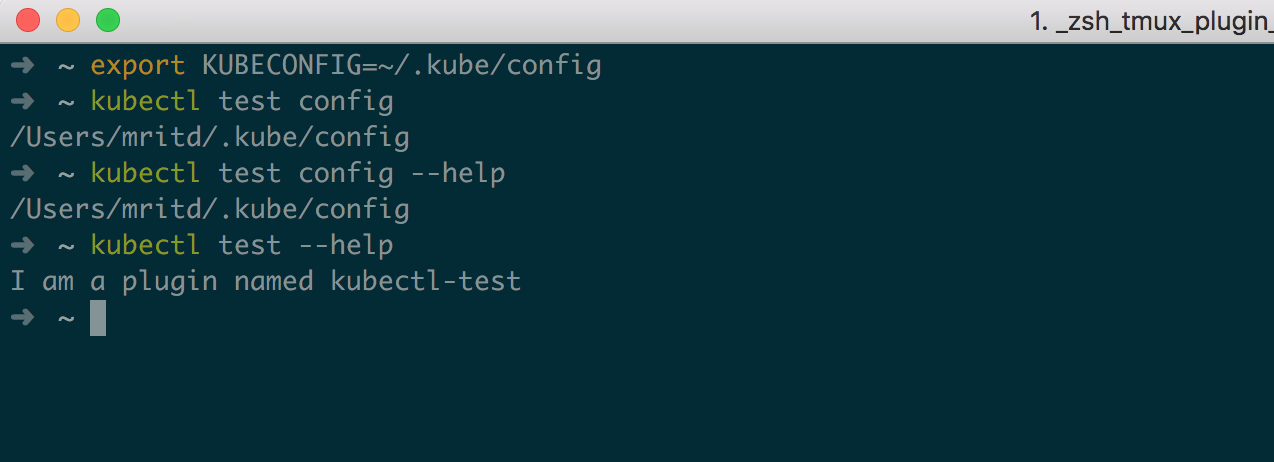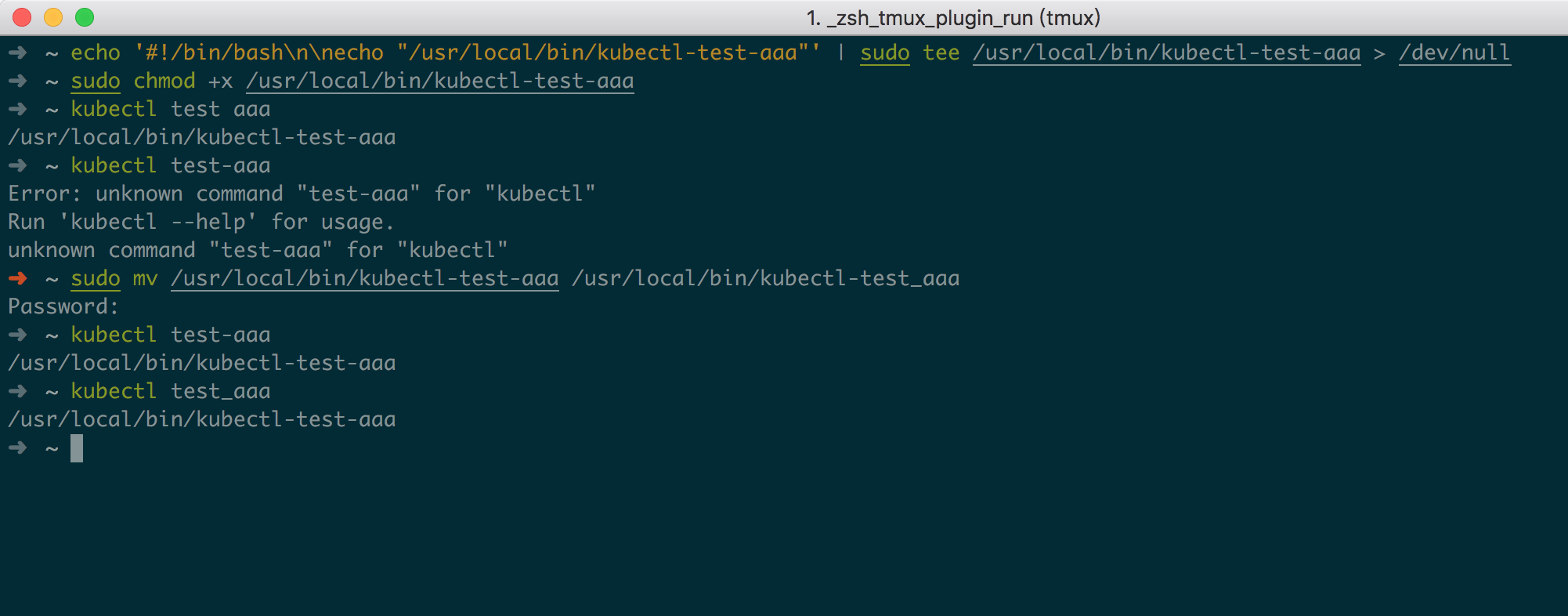在很久以前的版本研究过 kubernetes 的插件机制,当时弄了一个快速切换
namespace的小插件;最近把自己本机的 kubectl 升级到了 1.12,突然发现插件不能用了;撸了一下文档发现插件机制彻底改了…
一、插件编写语言
kubernetes 1.12 新的插件机制在编写语言上同以前一样,可以以任意语言编写,只要能弄一个可执行的文件出来就行,插件可以是一个 bash、python 脚本,也可以是 Go 等编译语言最终编译的二进制;以下是一个 Copy 自官方文档的 bash 编写的插件样例
#!/bin/bash
# optional argument handling
if [[ "$1" == "version" ]]
then
echo "1.0.0"
exit 0
fi
# optional argument handling
if [[ "$1" == "config" ]]
then
echo $KUBECONFIG
exit 0
fi
echo "I am a plugin named kubectl-foo"
二、插件加载方式
2.1、插件位置
1.12 kubectl 插件最大的变化就是加载方式变了,由原来的放置在指定位置,还要为其编写 yaml 配置变成了现在的类似 git 扩展命令的方式: 只要放置在 PATH 下,并以 kubectl- 开头的可执行文件都被认为是 kubectl 的插件;所以你可以随便弄个小脚本(比如上面的代码),然后改好名字赋予可执行权限,扔到 PATH 下即可

2.2、插件变量
同以前不通,以前版本的执行插件时,kubectl 会向插件传递一些特定的与 kubectl 相关的变量,现在则只会传递标准变量;即 kubectl 能读到什么变量,插件就能读到,其他的私有化变量(比如 KUBECTL_PLUGINS_CURRENT_NAMESPACE)不会再提供

并且新版本的插件体系,所有选项(flag) 将全部交由插件本身处理,kubectl 不会再解析,比如下面的 --help 交给了自定义插件处理,由于脚本内没有处理这个选项,所以相当于选项无效了

还有就是 传递给插件的第一个参数永远是插件自己的绝对位置,比如这个 test 插件在执行时的 $0 是 /usr/local/bin/kubectl-test
2.3、插件命名及查找
目前在插件命名及查找顺序上官方文档写的非常详尽,不给过对于普通使用者来说,实际上命名规则和查找与常规的 Linux 下的命令查找机制相同,只不过还做了增强;增强后的基本规则如下
PATH优先匹配原则- 短横线
-自动分割匹配以及智能转义 - 以最精确匹配为首要目标
- 查找失败自动转换参数
PATH 优先匹配原则跟传统的命令查找一致,即当多个路径下存在同名的插件时,则采用最先查找到的插件

当你的插件文件名中包含 - ,并且 kubectl 在无法精确找到插件时会尝试自动拼接命令来尝试匹配;如下所示,在没有找到 kubectl-test 这个命令时会尝试拼接参数查找

由于以上这种查找机制,当命令中确实包含 - 时,必须进行转义以 _ 替换,否则 kubectl 会提示命令未找到错误;替换后可直接使用 kubectl 插件命令(包含-) 执行,同时也支持以原始插件名称执行(使用 _)

在复杂插件体系下,多个插件可能包含同样的前缀,此时将遵序最精确查找原则;即当两个插件 kubectl-test-aaa、kubectl-test-aaa-bbb 同时存在,并且执行 kubectl test aaa bbb 命令时,优先匹配最精确的插件 kubectl-test-aaa-bbb,而不是将 bbb 作为参数传递给 kubectl-test-aaa 插件

2.4、总结
插件查找机制在一般情况下与传统 PATH 查找方式相同,同时 kubectl 实现了智能的 - 自动匹配查找、更精确的命令命中功能;这两种机制的实现主要为了方便编写插件的命令树(插件命令的子命令…),类似下面这种
$ ls ./plugin_command_tree
kubectl-parent
kubectl-parent-subcommand
kubectl-parent-subcommand-subsubcommand
当出现多个位置有同名插件时,执行 kubectl plugin list 能够检测出哪些插件由于 PATH 查找顺序原因导致永远不会被执行问题
$ kubectl plugin list
The following kubectl-compatible plugins are available:
test/fixtures/pkg/kubectl/plugins/kubectl-foo
/usr/local/bin/kubectl-foo
- warning: /usr/local/bin/kubectl-foo is overshadowed by a similarly named plugin: test/fixtures/pkg/kubectl/plugins/kubectl-foo
plugins/kubectl-invalid
- warning: plugins/kubectl-invalid identified as a kubectl plugin, but it is not executable
error: 2 plugin warnings were found
三、Golang 的插件辅助库
由于插件机制的变更,导致其他语言编写的插件在实时获取某些配置信息、动态修改 kubectl 配置方面可能造成一定的阻碍;为此 kubernetes 提供了一个 command line runtime package,使用 Go 编写插件,配合这个库可以更加方便的解析和调整 kubectl 的配置信息
官方为了演示如何使用这个 cli-runtime 库编写了一个 namespace 切换的插件(自己白写了…),仓库地址在 Github 上,基本编译使用如下(直接 go get 后编译文件默认为目录名 cmd)
➜ ~ go get k8s.io/sample-cli-plugin/cmd
➜ ~ sudo mv gopath/bin/cmd /usr/local/bin/kubectl-ns
➜ ~ kubectl ns
default
➜ ~ kubectl ns --help
View or set the current namespace
Usage:
ns [new-namespace] [flags]
Examples:
# view the current namespace in your KUBECONFIG
kubectl ns
# view all of the namespaces in use by contexts in your KUBECONFIG
kubectl ns --list
# switch your current-context to one that contains the desired namespace
kubectl ns foo
Flags:
--as string Username to impersonate for the operation
--as-group stringArray Group to impersonate for the operation, this flag can be repeated to specify multiple groups.
--cache-dir string Default HTTP cache directory (default "/Users/mritd/.kube/http-cache")
--certificate-authority string Path to a cert file for the certificate authority
--client-certificate string Path to a client certificate file for TLS
--client-key string Path to a client key file for TLS
--cluster string The name of the kubeconfig cluster to use
--context string The name of the kubeconfig context to use
-h, --help help for ns
--insecure-skip-tls-verify If true, the server's certificate will not be checked for validity. This will make your HTTPS connections insecure
--kubeconfig string Path to the kubeconfig file to use for CLI requests.
--list if true, print the list of all namespaces in the current KUBECONFIG
-n, --namespace string If present, the namespace scope for this CLI request
--request-timeout string The length of time to wait before giving up on a single server request. Non-zero values should contain a corresponding time unit (e.g. 1s, 2m, 3h). A value of zero means don't timeout requests. (default "0")
-s, --server string The address and port of the Kubernetes API server
--token string Bearer token for authentication to the API server
--user string The name of the kubeconfig user to use
限于篇幅原因,具体这个 cli-runtime 包怎么用请自行参考官方写的这个 sample-cli-plugin (其实并不怎么 “simple”…)
本文参考文档:
转载请注明出处,本文采用 CC4.0 协议授权